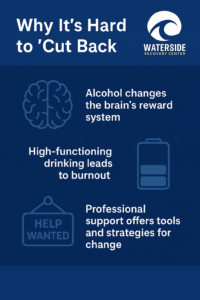You’ve probably said it before—maybe even this week: “I’ll just cut back.”
Maybe you swore off drinking during the week. Maybe you promised you’d only have two. Maybe you even made it a few days, felt proud, and then… found yourself pouring another glass and wondering what happened.
If that cycle feels familiar, you’re not alone. And you’re not weak, broken, or failing.
You’re stuck in a pattern that willpower alone can’t break.
At Waterside Recovery, we work with high-functioning individuals across Plymouth and Bristol Counties who’ve been managing their lives on the outside but losing traction inside. Many of them started by trying to “cut back”—and eventually realized they needed something more.
That’s where a structured Alcohol Addiction Treatment Program in Massachusetts can make all the difference—offering real tools, support, and strategies to create lasting change.
Here’s why cutting back often doesn’t work—and what can.
1. The Problem: Willpower Doesn’t Rewire Your Brain
Alcohol impacts the brain’s reward system in powerful ways. It creates short-term relief—calming anxiety, softening stress, helping you “reset”—but it also trains your brain to need that hit.
Over time, this changes how your brain responds to stress, emotion, and even pleasure.
That’s why you may:
- Drink after saying you wouldn’t
- Find “just one” turns into three—or more
- Feel more anxious, irritable, or flat when you try to stop
Cutting back asks you to manage a biological dependency with mental resolve. And for many people, especially those using alcohol to cope with underlying stress or trauma, that approach just doesn’t hold.
If your brain is wired for relief, it will always find a way—unless you address the wiring itself.
2. The Hidden Burnout of High-Functioning Drinking
If your life looks fine on the outside, it’s easy to downplay your drinking. You’re not getting DUIs. You’re not missing work. No one is confronting you.
But high-functioning doesn’t mean healthy. It means you’re performing through pain.
What we often hear from clients is:
- “I’m exhausted from pretending.”
- “I’m always calculating when and how I can drink.”
- “I wake up ashamed, even if I held it together.”
- “I’m tired of feeling foggy, numb, or off.”
Drinking might still be “working” in the sense that it gets you through the day—but it’s costing you clarity, energy, and peace.
And the longer it continues, the harder it is to untangle without real help.
3. Why Alcohol Addiction Treatment Works When Cutting Back Doesn’t
This is where professional help makes the difference—not because you’re broken, but because recovery takes more than discipline.
Alcohol addiction treatment gives you a full-spectrum plan:
- Medical support for withdrawal and cravings (when needed)
- Individual therapy to understand why drinking became a go-to
- Group sessions to reduce isolation and shame
- Skills training to manage stress, triggers, and emotional overwhelm
- Ongoing support to sustain progress in real life
At Waterside Recovery, we tailor treatment to the individual. That means you don’t get a “one-size-fits-all” solution—you get care that matches your lifestyle, goals, and readiness.
Most importantly: we don’t treat you like a problem to fix. We work with you to understand what alcohol was doing for you—so you can build new tools that do it better.

4. You Don’t Need a Label to Get Support
A lot of people hesitate to seek treatment because they don’t identify as “alcoholic.” That’s understandable. Labels can feel limiting—or even like a trap.
But you don’t need a diagnosis to deserve care.
If alcohol is costing you more than it’s giving you—emotionally, mentally, or physically—that’s enough.
We see clients every day who are:
- Managing careers, families, and responsibilities
- Still wondering, “Is it really that bad?”
- Afraid of being judged, exposed, or forced into something
At Waterside, we don’t pressure. We don’t label. We help you get honest about what’s working, what isn’t, and what’s possible next.
You don’t need to collapse to begin. You just need to be ready for something better.
5. There’s a Different Way Forward—Closer Than You Think
If you’re reading this, it’s because something in you is already curious.
That’s a powerful starting point.
Treatment doesn’t mean disappearing from your life. With outpatient and day treatment options, you can:
- Get support while still working or caring for family
- Learn coping skills without shame or pressure
- Start to feel clearer, stronger, and more connected to yourself
You don’t have to fake it anymore. You don’t have to keep negotiating with your cravings or hiding behind control.
There’s another way to live—and we can help you find it.
Frequently Asked Questions (FAQs)
How do I know if I need treatment vs. just trying harder?
If you’ve been trying to cut back for a while and keep returning to the same patterns, that’s a sign willpower alone isn’t working. Treatment doesn’t mean failure—it means choosing a smarter strategy.
What if I can’t take time off work or family life?
Waterside offers flexible outpatient options, including evening groups and day programs that don’t require overnight stays. We’ll help you find a plan that fits your schedule and responsibilities.
Will I be forced to stop drinking completely?
We work with your goals. Some clients aim for abstinence. Others start by exploring moderation. Our focus is on safety, honesty, and sustainable change—not forcing an identity or path on you.
What if I already tried treatment and it didn’t help?
That’s okay. Many people need a different approach—or were in the wrong level of care. At Waterside, we re-evaluate what didn’t work and build something new that aligns with where you are now.
Is alcohol addiction treatment covered by insurance?
In many cases, yes. We can check your coverage and help you understand your options. Don’t let finances stop you from exploring what’s possible.
You Don’t Have to Keep Doing This Alone
Call us today at (866) 671-8620 or Contact Us to learn more about alcohol addiction treatment in Plymouth and Bristol Counties, MA.
We’re not here to judge or push—we’re here to walk beside you, step by step.
Let’s find out what your life could feel like when it isn’t built around cutting back.


